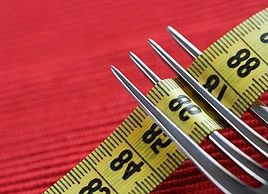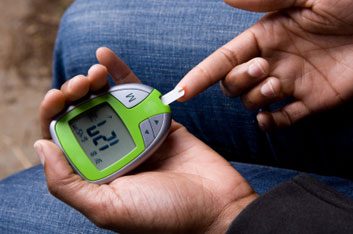
The benefits of a healthy weight
Thinking of dropping a few pounds? If you’re overweight and have diabetes, it’s one of the best things you can do for your overall health. A study at the Kaiser Permanente’s Center for Health Research in Oregon found that people who shed weight within about 18 months of being diagnosed with type-2 diabetes were more likely to keep long-term control over their blood pressure and glucose levels.
When you have diabetes, a healthy weight reduces your risk of cardiovascular disease and actually helps your body’s own insulin to work better. “In addition, people who lose weight generally feel better. It’s value added!” says Dr. Ian Blumer, a diabetes specialist in Ajax, Ontario, and author of Diabetes for Canadians for Dummies.
Want work towards a healthy number on the scale? These six tips will help you reach your goal.

1. Talk to your healthcare team
Let your dietitian, nurse educator and/or doctor know that you’re taking on the task of losing weight. “Find out if there should be some change in your therapy,” says Blumer. Your healthcare professional can also help you set reasonable goals. Fad diets are definitely not recommended. But if you do plan to make drastic changes to your daily menu, it’s critically important you have medical guidance, Blumer says. “Before adopting a low-carb diet, a doctor should be consulted as certain medications-such as insulin-may need to be adjusted in order to avoid low blood glucose.”

2. Count your calories
Losing weight means cutting calories, but it doesn’t have to mean eliminating everything you love to eat. Just eat smaller portions, and focus on low-fat foods. Try keeping a record of what you’re eating and how many calories you’re consuming. That way you’ll be able to identify the sneakiest calorie hits. Plus if you plan your meals and snacks ahead of time, you’ll have more success and fewer junk-food grabs. “Also, don’t skip meals,” says Blumer, “because you’ll tend to eat more at the next meal, and then your blood sugars go up.”

3. Get off your duff
Physical activity is another important part of a weight-loss plan, especially if you have diabetes. Regular exercise, just like weight control, boosts the effectiveness of your body’s own insulin. It can reduce your need for medication. And it helps lower blood pressure, another bonus for people with diabetes. You’ll also benefit from all the other perks of being active: better sleep, higher energy and greater sense of well-being. Increase your activity level gradually. If you have other medical problems related to diabetes, like foot ulcers or eye conditions, talk to your healthcare professional about which activities you should avoid.

4. Check, check, then check again
As you change your diet, increase your physical activity level and start shedding pounds, you should also keep better track of your blood sugar. That’s because changes such as increased exercise, meal differences and stress can cause your sugar levels to shift. “If you’re controlling your blood sugar through lifestyle alone, it’s not a concern. But if you’re losing weight and you’re on blood-glucose lowering medication, you may need to check your blood glucose levels more often, to determine if your medication needs changing” Blumer says.

5. Drink water
Thirsty? Pour yourself a glass of what’s on tap-the water tap, that is. Drinks such as fruit juice and alcohol may satisfy your thirst, but they’re also loaded with calories. And while we’ve all heard that sugar-sweetened drinks increase the risk of type-2 diabetes, it may surprise you to know there’s some evidence suggesting that diet drinks with artificial sweeteners may actually make you gain weight, too. Researchers at Purdue University found that rats who ate food sweetened with saccharin actually ingested more calories and gained more weight than those who ate food sweetened with regular sugar. Not a fan of plain water? Try adding a few slices of lemon.

6. Support instead of sabotage
Once you’ve set your sights on losing weight, don’t set traps for yourself, says Blumer, who has also written Diabetes Cookbook for Canadians for Dummies. One example: Don’t stock your kitchen with the wrong kinds of snacks. “A lot of people have kids, and keep cookies and ice cream in the house,” he notes. “This may act as a temptation for the person living with diabetes.” But don’t put such tight limits on treats that you feel deprived. “You’ll let loose and eat five pieces of cake.” When you’re hungry between meals, choose healthy snacks like fresh fruit, multigrain toast or veggie sticks with low-fat cream cheese, and allow yourself other goodies in moderation.
Related:
• NEW! 2-Day Diabetes Diet
• 6 tips for exercising when you have diabetes
• Diabetes and weight loss
